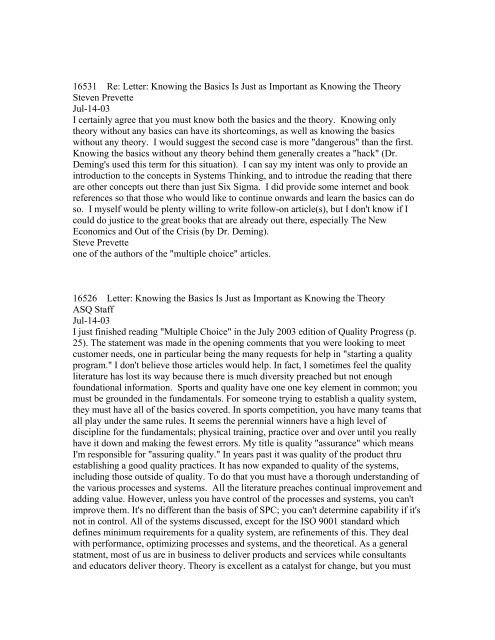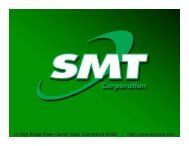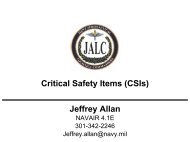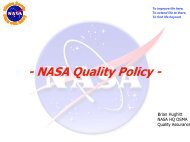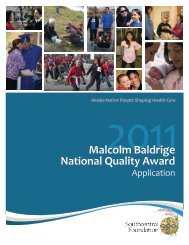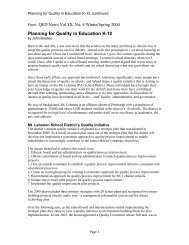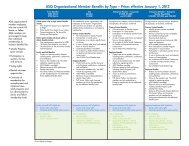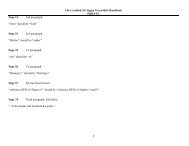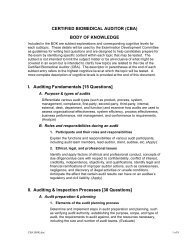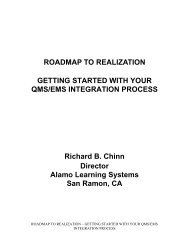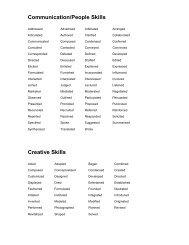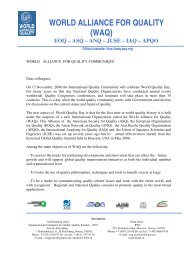Quality Progress - American Society for Quality
Quality Progress - American Society for Quality
Quality Progress - American Society for Quality
Create successful ePaper yourself
Turn your PDF publications into a flip-book with our unique Google optimized e-Paper software.
16531 Re: Letter: Knowing the Basics Is Just as Important as Knowing the Theory<br />
Steven Prevette<br />
Jul-14-03<br />
I certainly agree that you must know both the basics and the theory. Knowing only<br />
theory without any basics can have its shortcomings, as well as knowing the basics<br />
without any theory. I would suggest the second case is more "dangerous" than the first.<br />
Knowing the basics without any theory behind them generally creates a "hack" (Dr.<br />
Deming's used this term <strong>for</strong> this situation). I can say my intent was only to provide an<br />
introduction to the concepts in Systems Thinking, and to introdue the reading that there<br />
are other concepts out there than just Six Sigma. I did provide some internet and book<br />
references so that those who would like to continue onwards and learn the basics can do<br />
so. I myself would be plenty willing to write follow-on article(s), but I don't know if I<br />
could do justice to the great books that are already out there, especially The New<br />
Economics and Out of the Crisis (by Dr. Deming).<br />
Steve Prevette<br />
one of the authors of the "multiple choice" articles.<br />
16526 Letter: Knowing the Basics Is Just as Important as Knowing the Theory<br />
ASQ Staff<br />
Jul-14-03<br />
I just finished reading "Multiple Choice" in the July 2003 edition of <strong>Quality</strong> <strong>Progress</strong> (p.<br />
25). The statement was made in the opening comments that you were looking to meet<br />
customer needs, one in particular being the many requests <strong>for</strong> help in "starting a quality<br />
program." I don't believe those articles would help. In fact, I sometimes feel the quality<br />
literature has lost its way because there is much diversity preached but not enough<br />
foundational in<strong>for</strong>mation. Sports and quality have one one key element in common; you<br />
must be grounded in the fundamentals. For someone trying to establish a quality system,<br />
they must have all of the basics covered. In sports competition, you have many teams that<br />
all play under the same rules. It seems the perennial winners have a high level of<br />
discipline <strong>for</strong> the fundamentals; physical training, practice over and over until you really<br />
have it down and making the fewest errors. My title is quality "assurance" which means<br />
I'm responsible <strong>for</strong> "assuring quality." In years past it was quality of the product thru<br />
establishing a good quality practices. It has now expanded to quality of the systems,<br />
including those outside of quality. To do that you must have a thorough understanding of<br />
the various processes and systems. All the literature preaches continual improvement and<br />
adding value. However, unless you have control of the processes and systems, you can't<br />
improve them. It's no different than the basis of SPC; you can't determine capability if it's<br />
not in control. All of the systems discussed, except <strong>for</strong> the ISO 9001 standard which<br />
defines minimum requirements <strong>for</strong> a quality system, are refinements of this. They deal<br />
with per<strong>for</strong>mance, optimizing processes and systems, and the theoretical. As a general<br />
statment, most of us are in business to deliver products and services while consultants<br />
and educators deliver theory. Theory is excellent as a catalyst <strong>for</strong> change, but you must


